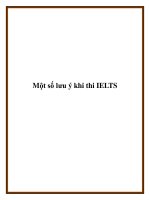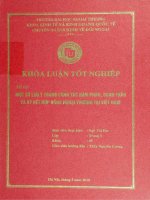một số lưu ý trong ngữ pháp ôn thi TOEFL
Bạn đang xem bản rút gọn của tài liệu. Xem và tải ngay bản đầy đủ của tài liệu tại đây (968.87 KB, 56 trang )
MỘT SỐ ĐIỂM NGỮ PHÁP CẦN
LƯU Ý TRONG TOEFL
!"
#$"%
&'(
!%$%)!*$+"#,
!%$%)!*$+',
-' .%!(
/#"0 !%.'
.%%#"!" " "*
% " &*%$*# "'%
&'(
%*"%%+"%,$"#
2
/*%.0". !' 0*
$"' *''%""%'
''%""%' % %!
12''%"%'31!
%&'(
!%"%"!'%'%
*%.##"!*""#
!"$%. ""'"!".%"%"
#%..%.""%%)"#*
3
/.%%$"#&'"%%!% %! (
4%#$"4%#$"4%'" *4$
&'(
0%#$"# %." 0"
#%"#%'*%"#
%"0%'" *"$". " 0"
"!"#%"#
56% $*)"#! '%%(
%$% %.%. *#""#
'.%%$"#$% .%%$ *"#
! '%%".%$"#"
5
any + singular noun no + singular noun some + singular noun
anybody nobody Somebody
anyone noone Someone
anything nothing Something
every + singular noun each + singular noun
everybody Each person
everyone *either
everything *neither
* and are singular if they are not used with and .
Examples:
- Everybody who has not purchased a ticket should be in this
line.
- Something is under the table.
- If either of you takes a vacation now, we will not be able to
finish the project.
- Anybody who has lost his ticket should report to the desk.
- No problem is harder to solve than this one.
- Nobody works harder than him.
"7"(
6" ".%%$ *% %0
!*"#%'0 ' "#%$
%.%%$"#% %""#%'
89)%.%%$"#.%
"7"1%1%7%1'%1'
!
&'(
"%%"." #%"#%
% *
"%%"." #%"#%% *
"7"1%1%7%1"#%1
"#!
&'(
"%%""#%"#%% *
"%%""#%"#%% *
8
3. None / No:
3.1. can take either singular or plural verb, depending on the noun
which follows it.
none + of the + non-count noun + singular verb
Example:
None of the counterfeit money has been found.
none + of the + plural count noun + plural verb
Example:
None of the students have finished the exam yet.
3.2. can take either a singular or plural verb depending on the noun
which follows it.
no + singular / non count noun + singular verb
Example:
No ticket is required.
no + plural noun + plural verb
Example:
No tickets are required.
4. Gerunds As Subjects:
If a sentence begins with {verb+ing} (gerund), the verb
must be a singular. Let's study the following examples.
Example:
- Working for him is the best choice I've made.
- Going out at night doesn't seems interesting to me.
- Not studying has cause him many problems.
5. Collective Nouns
- Many words indicating a number of people or animals are singular. The
following nouns are usually singular. In some cases they are plural if sentence
indicates that the individual members are acting separately.
congress family group committee class
organization team army club crowd
government jury majority* Minority public
* majority can be singular or plural. If it is alone it is usually singular; if it is followed
by plural noun, it is usually plural.
The majority believes that we are in no danger.
The majority of the students believe him to be innocent.
Examples of collective nouns:
- The committee has met, and it has rejected the proposal.
- The family was elated by the news.
- The crowd was wild with excitement.
- Congress has initiated a new plan to combat inflation.
- The organization has lost many members this years.
- Our team is going to win the game.
.%%$"# % % " " #%' %. "
"*#%' %"
"#
flock of birds, sheep school of fish
herd of cattle pride of lions
pack of dogs
&'(
1
.%)
%." """#%!
1
%.")"#$*
1
%%
%.."""#) *)
6. A Number Of / The Number Of :
A number of + plural noun + plural verb : một số
The number of + plural noun + singular verb : số
Example:
- A number of students are going to the class picnic. (a number
of = many)
- The number of the days in a week is seven.
- A number of the applicants have already been interviewed.
- The number of residents who have been questioned on this
matter is quite small.
13
7. Nouns are that always plural:
The following nouns are always considered plural. They can not be
singular. In order to speak of them as singular, we must say "a pair of
eyeglasses".
Let's study the following examples:
- The pants are in the drawer.
- A pair of pants is in the drawer.
- The pliers were on the table.
- The pair of pliers was on the table.
- These scissors are dull.
- This pair of scissors is dull.
scissors shorts pants jeans tongs
trousers eyeglasses pliers tweezers
8:;(
<=>?@+,=><ABCD(
/EF%G('*"+!HG;,0"+%I,
/EJGHG(+KL",0'+M""G,
EJ:KC(" +:KC*N,0""'"0O
/:N6(":C
15
1. Neither Bill nor Mary (is / are) going to the play tonight.
2. Anything (is / are) better than going to another movie tonight.
3. Skating (is / are) becoming more popular every day.
4. A number of reporters (was / were) at the conference yesterday.
5. Anybody who (has / have) a fever must go home immediately.
6. Your glasses (was / were) on the bureau last night.
7. There (was / were) some people at the meeting last night.
8. The committee (has / have) already reached a decision.
9. A pair of jeans (was / were) in the washing machine this morning.
10. Each student (has / have) answered the first three questions.
!"#!$!!!
$%!
&'!%!
( "!!%!!#$
)'*#$%$!
+'$%!
,'##!!
-#%""
.'%$#"
/$$%
0"%
123$456
78 9 : ; < = 1 > ?# @ 4 A
<=@B<5ACD
E3FG@1H@23$456
78CI@9:<=1>
?#@4A<=@B<5AC
D
&J@3$3FG-#K9
78 CI 9:<=C@L :1
>
?# @4A< =A M KN@FO<
5ACD
I. FIRST CONDITIONALS
A. Form
We use the present simple tense in the if clause and the
future with will in the main clause. We usually use a comma
(,) when the if clause is first, but not when the main clause is
first.
If she all that ice cream, sheterrible.
If I time, IP"you later.
YouPhungry if you !Qsome dinner.
They Qon time if they the bus.
R!##
SQ
NOT SQ
.
TU<U8
T"% ""%' "%.%'%
"%%!
.*%#'0*%V"''%"
+"*%V#',
6$%V#%".""
+""$"",
U<U<U8
T%
/ 6 ' "' .% " ".
$% 1"."""!$"%%""
/ 6 * % +0, $ ". "
."0%$""."
. %#%*0$% *%
.*% " V%0*%W %$"#
=W .". " V%)%
*$% V'* ""."$ ""#
%(6 %%$% "".
. %#%*O
U.$% !%#%*O
U<U<U8
% % ""% " 0
")*0%"#"*""%
. $ % %*0 $V ! "
6$% *% %".*%$#%X
=<U<U8
T%
6 ' '. +%"%, .% "
". $% ! 1 ' '""' "
"
6 * % +0, $ ". "
."0%$""."
. *% V " % 0 *% $% !
."
$% !' ".W $%)
* $% V ! % ". * V $
%*%
=<U<U8
/ 6 " % ""% % " %"#
" V ''0 "#"* ""% "
'
. $%) $% !' &
+ " V$%) 0 " V'&,
Y%$% V! ".*% V "!"#
%.
+Y%$ "!"#%%.0 *% ,
/6"%"#".
= $%) $% !' &
= *% % "!"# % .0 Y% $% V !
-.* .%"0*ZZZZZZZ+[#"!,%
#"#%"'%*% %)"###
5.."" .%T" *0///+#"!,"%*".%
" *
\. %!"ZZZZZZZ+,*%%""#
]= %%". """^"'%0__
+,'$
`=$% #"!*%%*".ZZZZZ+!,"
a$% *%" "*".ZZZZZ+ ,'
b= *"! *0*ZZZZZZ+." ,
"%
c.*%!%#"0'ZZZ+'",".%*%!
d6% #%.% "!".% *ZZZZZZZ+, *
-e.$"'"f0"$"ZZZZZZ+$",!*
$
_______+',".*"!"%'*
-5.*%%ZZZZZZZZ+*,.%*%0$"*%''*X
-\.ZZZZZ+ " ,"0% !.%.%%
."#
-]= $)%$*% 0$ZZZZZZZ+$",*%
-`.%%. %^%%%0"ZZZZZZZ+),""
-a* %#$*$)'".ZZZZZZ+,#%"
-b.*%ZZZZZZZ+,*% *0')%
-c.ZZZZZZ+#,"0"$" %#%% %
-d$"%'%$%)".$ZZZZZZ+,""
5e. . *0ZZZZZZ+,
5-.* )%$"0*ZZZZZZ+),%"
55=$% "".*%ZZZZZZ+&'","%"%
%$*
5\% T".ZZZ+'),%
%$*









